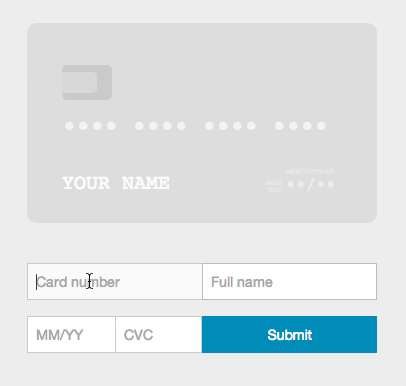Card - check out the demo
Card will take any credit card form and make it the best part of the checkout process (without you changing anything). Everything is created with pure CSS, HTML, and Javascript — no images required.
To use, you'll need to include the correct CSS and Javascript files into your HTML. You can find the necessary files at /lib/js/card.js and /lib/css/card.css and include them in your HTML like so.
<!-- in HEAD -->
<link rel="stylesheet" href="/path/to/card.css">
<!-- at the end of BODY -->
<script src="/path/to/jquery.js"></script>
<script src="/path/to/card.js"></script>Once you've included those files, you can initialize Card.
$('form').card({
// a selector or jQuery object for the container
// where you want the card to appear
container: '.card-wrapper', // *required*
numberInput: 'input#number', // optional — default input[name="number"]
expiryInput: 'input#expiry', // optional — default input[name="expiry"]
cvcInput: 'input#cvc', // optional — default input[name="cvc"]
nameInput: 'input#name', // optional - defaults input[name="name"]
width: 200, // optional — default 350px
formatting: true, // optional - default true
// Strings for translation - optional
messages: {
validDate: 'valid\ndate', // optional - default 'valid\nthru'
monthYear: 'mm/yyyy', // optional - default 'month/year'
},
// Default values for rendered fields - options
values: {
number: '•••• •••• •••• ••••',
name: 'Full Name',
expiry: '••/••',
cvc: '•••'
}
});Card can be used in forms where you have multiple inputs that render to a single field (i.e. you have a first and last name input). To use Card with this functionality, just pass in a jQuery selector that selects the fields in the correct order. For example,
<form>
<input type="text" name="number">
<input type="text" name="first-name"/>
<input type="text" name="last-name"/>
<input type="text" name="expiry"/>
<input type="text" name="cvc"/>
</form>
<script>
$('form').card({
container: '.card-wrapper',
nameInput: 'input[name="first-name"], input[name="last-name"]'
});
</script>Card renders with default values for card name, number, expiry, and cvc. To override these values, you can either pass in a values object or set $.card.values before initializing card. Do one or the other, not both.
<script src="/path/to/card.js"></script>
<form>
<input type="text" name="number">
<input type="text" name="name"/>
<input type="text" name="expiry"/>
<input type="text" name="cvc"/>
</form>
<script>
// setting $.card.values is one way to override
// the default card values
$.card.values = {
number: '**** **** **** ****',
name: 'Arya Stark',
expiry: '**/****',
cvc: '***'
}
$('form').card({
container: '.card-wrapper',
// passing in a messages object is another way to
// override the default card values
values: {
number: '**** **** **** ****',
name: 'Arya Stark',
expiry: '**/****',
cvc: '***'
}
});
</script>To render the card with the strings in a different language, you can either pass in a messages object or set $.card.messages before initializing card. Do one or the other, not both.
<script src="/path/to/card.js"></script>
<form>
<input type="text" name="number">
<input type="text" name="name"/>
<input type="text" name="expiry"/>
<input type="text" name="cvc"/>
</form>
<script>
// setting $.card.messages is one way to override
// the default field names
$.card.messages = {
validDate: 'expire\ndate',
monthYear: 'mm/yy'
}
$('form').card({
container: '.card-wrapper',
// passing in a messages object is another way to
// override the default field names
messages: {
validDate: 'expire\ndate',
monthYear: 'mm/yy'
}
});
</script>To contribute, follow this steps:
$ git clone --recursive https://github.com/jessepollak/card.git
$ cd card
$ npm install
$ npm startNow, if you go to localhost:8080/example in your browser, you should see the demo page.
Card is used in the wild in these places:
Are you using Card in production? If so, we'd love to link to you from this page. Open a PR or drop @jessepollak a line on Twitter and we'll add you right away!
